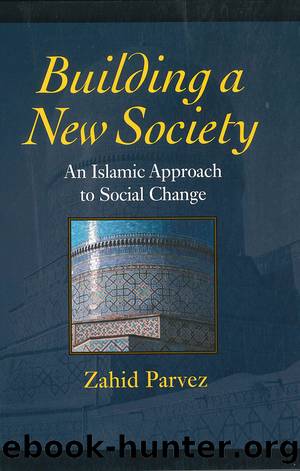Building a New Society by Zahid Parvez

Author:Zahid Parvez
Language: eng
Format: epub
Publisher: Kube Publishing Ltd
The Goal â Establishment of Godâs Sovereignty
Let us now move onto exploring the goal of Islamic change. Once people set themselves free from the influence of false gods, a huge amount of energy becomes available for constructive work. Islam then channels this energy towards accomplishing its goal in society. This goal is to establish the Sovereignty of God in social life and the state. In concrete terms, this implies that efforts must be directed towards changing the socio-political environment that aids in awakening people and freeing them from the influence of false gods, nurturing morality and establishing justice in all systems of social life.
Islam stresses that Sovereignty, that is the absolute power to command, to define beliefs, laws, rights and wrongs, belongs only to Allah. It cannot be shared between different gods; cannot be distributed amongst a number of individuals or groups.
âHe alone is the Sovereign of the Heavens and the Earth â¦â
(az-Zukhruf 43: 84)
It can be inferred from this that the meaning of the Sovereignty of God has great social and political implications. It sets parameters for the use of power in society. It calls for the dethroning of all false gods in society â strips them of their sovereignty, so that all power is submitted to the All-Powerful God. In other words, Islam aims to build a society that is free from religious, social or political hierarchies, and in which everyone, including the policy makers, social institutions, and the rich and wealthy in society, can all be held accountable for their actions. Islam emphasises that no one can be above the law or allowed to abuse power and authority in any way. Allah Alone is the supreme authority in society. However, political sovereignty â a limited, relative sovereignty (mulk), or the power to enforce the law, can be vested in an Islamic government, which has to rule in accordance with Divine guidance.
Thus, a caliph, the head of the Muslim world-community, is not considered as a sovereign, a dictator, or someone with extraspecial rights and privileges. Rather he is respected, but at the same time he is accountable to the people for all actions concerning his office. He has to govern and conduct societal affairs according to Godâs revealed guidance and adhere to the system of shura, i.e. consultation in all decision making with the citizens directly or with a representative body. To give an example, below is a quote from a speech delivered by the first Caliph, Abu Bakr (d. 634 CE) upon his taking office:
âHelp me if I am in the right; set me right if I am in the wrong .. .Obey me as long as I obey Allah and His Prophet; If I disobey Him and His Prophet, then obey me notâ¦â10
Islam emphasises that the establishment of Godâs Sovereignty can alone ensure justice to all people. Reflection over this statement is important. If sovereignty and the exercise of absolute power are in the hands of any particular individual or group, they will naturally use this
Download
This site does not store any files on its server. We only index and link to content provided by other sites. Please contact the content providers to delete copyright contents if any and email us, we'll remove relevant links or contents immediately.
| Hadith | History |
| Law | Mecca |
| Muhammed | Quran |
| Rituals & Practice | Shi'ism |
| Sufism | Sunnism |
| Theology | Women in Islam |
The History of Jihad: From Muhammad to ISIS by Spencer Robert(2212)
Nine Parts of Desire by Geraldine Brooks(2011)
The Turkish Psychedelic Explosion by Daniel Spicer(1993)
The First Muslim The Story of Muhammad by Lesley Hazleton(1887)
The Essential Rumi by Coleman Barks(1635)
The Last Mughal by William Dalrymple(1573)
Trickster Travels: A Sixteenth-Century Muslim Between Worlds by Davis Natalie Zemon(1546)
1453 by Roger Crowley(1492)
by Christianity & Islam(1351)
God by Aslan Reza(1336)
Muhammad: His Life Based on the Earliest Sources by Martin Lings(1296)
A Concise History of Sunnis and Shi'is by John McHugo(1278)
Magic and Divination in Early Islam by Emilie Savage-Smith;(1203)
The Flight of the Intellectuals by Berman Paul(1184)
No God But God by Reza Aslan(1161)
Art of Betrayal by Gordon Corera(1136)
What the Qur'an Meant by Garry Wills(1122)
Getting Jesus Right: How Muslims Get Jesus and Islam Wrong by James A Beverley & Craig A Evans(1081)
The Third Choice: Islam, Dhimmitude and Freedom by Durie Mark & Ye'or Bat & Bat Ye'or(1069)
